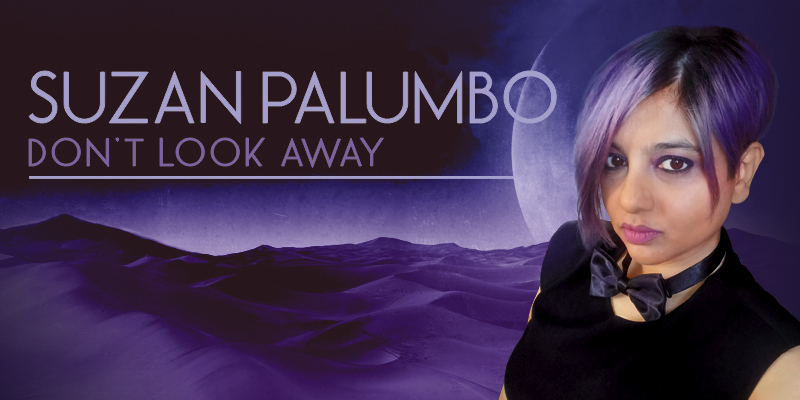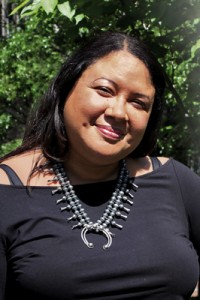Suzan Palumbo: Don’t Look Away

SUZAN PALUMBO was born in the 1980s in Trinidad & Tobago, and moved to Canada with her family as a young child. She grew up in Rexdale, Toronto, a Caribbean and South Asian immigrant neighborhood.
Palumbo began publishing work of genre interest with ‘Bloody Therapy’ in 2017, and has published more than a dozen pieces since in various magazines and anthologies, including WSFA Small Press Award and Nebula Award finalist “Laughter Among the Trees” (2021) and World Fantasy, Aurora, and Nebula Award finalist “Douen” (2022). Some of her short work was collected in Skin Thief (2023), a Locus Award and Aurora Award finalist. Her latest book is Gothic space opera novella Countess (2024).
Palumbo is also an essayist, cofounder of the Ignyte Awards with L.D. Lewis, and one of the organizers of FIYAHCON. She was an associate editor for Shimmer magazine, and guest edited the Caribbean special issue of Strange Horizons with Marika Bailey in 2023.
She lives in Brampton, Ontario, Canada.
Excerpt from the interview:
 “Countess is a very anticolonial story, and it’s also a very personal story. It’s about a woman who has certain beliefs about what and who she should be and how she should behave, and her coming to a point in her life where she basically gets slapped in the face. She has to deal with that and make a decision about how she’s going to respond. That’s the same sort of conflict you see in my short stories, just across a novella.
“Countess is a very anticolonial story, and it’s also a very personal story. It’s about a woman who has certain beliefs about what and who she should be and how she should behave, and her coming to a point in her life where she basically gets slapped in the face. She has to deal with that and make a decision about how she’s going to respond. That’s the same sort of conflict you see in my short stories, just across a novella.
“I consider myself a horror writer, but Countess is not horror. It’s a space opera. I see myself as a dark fiction writer, a Gothic writer – but a Gothic writer who writes Gothic stories that don’t necessarily take place in Victorian mansions in England with rich white people. I wrote an essay about this for Nightmare magazine, ‘The Un-manored Gothic’, about how Gothic stories are always about rich white people, and their struggles. Why can’t people who live in apartment buildings or in a trailer have that same Gothic catharsis? Even though Countess is a space opera, I’m sneaking in the Gothic vibes. Skin Thief is Gothic, too – it’s the same idea, somebody struggling with their internal monsters and trying to make sense to themselves.
“I don’t believe in pat solutions in stories. I like fiction that feels realistic. It’s fiction, so we can’t say it is real, but I like narratives that don’t shy away from what I feel is the truth. I feel that pat solutions are not the truth because I have not seen very many of those in real life.
“I enjoy horror because I feel – this is my feeling, this is not me saying it’s a fact – that horror gives me the truth. We live in a not-nice world. There are not-nice people, and we live in a very brutal, harsh world. There are some people who experience the full extent of that, and there are others who don’t, and are able to turn away. One of the things horror does is say to you, ‘No, don’t look away. You’re going to look at this, because this is what people are capable of.’ That’s really interesting because some people think horror writers must be horrible people because they’re writing these horrific situations; they’re writing about violence, they’re writing about all these terrible event and blood and trauma. And it’s like, ‘Okay, but you do understand that most of the violence that appears in a horror book has been done already?’ This writer isn’t inventing murder, right? They’re not teaching you this for the first time. Humans kill and harm each other. Horror writers aren’t horrible people promoting violence. They’re exploring an impulse that is very latent within human beings, and it’s pretty brave to confront those ideas rather than to self-righteously say, ‘Oh, I’m a perfect person and I’ve never done anything wrong to anyone ever or had a negative harmful thought.’ Personally, I think the way we work towards a kinder world is by acknowledging the real horrors that exist, confronting them, and learning how to never repeat them at a structural and personal level.
“Countess is many things. I wanted to write a space opera, Gothic adventure, queer anticolonial story – and I think I did it! I’ve never done a space opera before, but I did enjoy Star Trek: The Original Series as a kid. I’m from the ‘80s, so Star Wars too. I like Dune. I also love The Count of Monte Cristo, which was part of the inspiration for the novella. Mostly I was like, ‘What if I put Trinidadians in space?’ That’s not coherent, but those are all the ideas that were swimming around in my head when I wrote Countess. I also wanted to write something pulpy, and soap opera-ish, and Gothic. We have American pulp, right – do we have Caribbean pulp stories? I have not read one.
“The book is set in the far future. The Caribbean has been ravaged by hurricanes and rising sea levels, which is a real crisis that is happening. I just read the other day about some islands off the Caribbean coast of Panama. The people who live on them have to move because the water is rising and their islands are so tiny that they are being flooded. That part of the book is quite realistic – climate change has messed up the situation in the Caribbean. So the people who live in the Caribbean, in Countess, even though they were very wary of this, decided to leave Earth by indenturing themselves to corporations in space. The use of indentured labor in the novella is a direct parallel to the actual history of the Caribbean.
“In the far future, there are planets that are basically treated like Caribbean countries. There are people that work in mines there and they send all the resources back to the capital. My protagonist Virika is the kid of immigrant parents who won the lottery to leave their colonized planet. They have moved to the heart of the empire to give Virika the chance to try and work her way up and get an education so that she can have a better life. That’s what her parents want for her. She’s very Trinidadian – she’s Indo-Caribbean but also has Afro-Caribbean ancestry. Her family is very multiracial.
“The empire is called Æerbot, and she’s in Invicta, the capital. She has decided to become the model minority because, ‘If I’m good enough, they will accept me, and I will raise my family out of poverty.’ She’s worked hard, and she has moved up. She’s in the Merchant Marine, and her captain, who is descended from white Europeans, has said that if there’s a catastrophe or accident where he cannot be in charge, Virika should take his place. There is another lieutenant on the ship who does not like this – he has a problem with it. When we meet her, she’s in charge of the ship, but people are vexed with her being in charge. When she gets back home, all of that animosity explodes. I don’t want to give away the book, but decisions she made on the journey home are used against her to incriminate her. She reaches a point where she has to make a decision after all of this blows up in her face.
“I think Virika becomes braver than me. I have a big mouth sometimes, and if I don’t agree with something, I will tell you I don’t agree with it. She is like that too, but more so. She is much more extreme than I am. I still have some diplomacy, but I have not gone through the trauma she has; she’s just like, ‘Fuck off,’ to certain people by the end.
“All my work is personal. The stories in Skin Thief were very emotionally personal, about my personal life and interpersonal relationships. Countess is personal on a more social/political/economic/moral level. Of course, I have felt a lot of the emotions that Virika feels. In order for feelings to come across as authentic in a story, the author probably has to have felt something like them before in order to portray it, or at least spent a long time thinking about how it feels. There is emotional exploration in there, but overall it’s much more political. It’s got all kinds of ideas in it. I am definitely saying something about writing, about colonization, about the individual in colonization, about the Chosen One trope; there’s a lot going on in Countess.
“For me, horror is often about crossing boundaries. As a writer, I treat stories like that. I will write a piece, and think, ‘Oh, that’s very personal, or vulnerable, or maybe I’ve crossed the line, or maybe that’s too much.’ But when you cross the line, that’s the magic!
Interview design by Francesca Myman
Read the full interview in the November 2024 issue of Locus.
 While you are here, please take a moment to support Locus with a one-time or recurring donation. We rely on reader donations to keep the magazine and site going, and would like to keep the site paywall free, but WE NEED YOUR FINANCIAL SUPPORT to continue quality coverage of the science fiction and fantasy field.
While you are here, please take a moment to support Locus with a one-time or recurring donation. We rely on reader donations to keep the magazine and site going, and would like to keep the site paywall free, but WE NEED YOUR FINANCIAL SUPPORT to continue quality coverage of the science fiction and fantasy field.
©Locus Magazine. Copyrighted material may not be republished without permission of LSFF.







